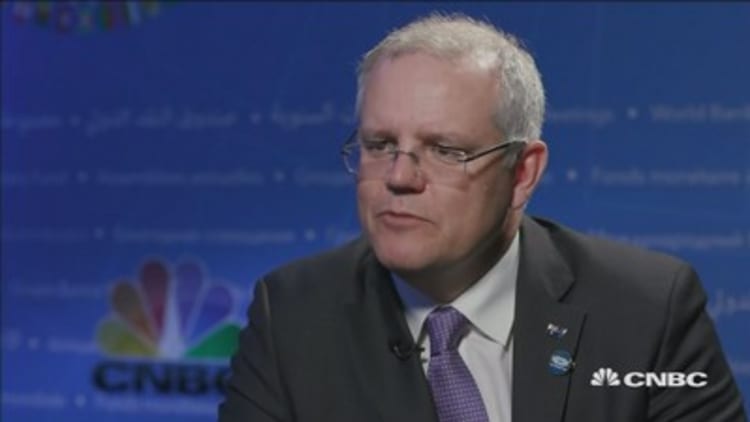
Household debt in Australia has been on the rise as more people are taking out loans to buy houses in the country's red-hot property market. But Australian Treasurer Scott Morrison said the situation is under control thanks to a series of "strong" measures undertaken by the country's regulators.
According to the Australian Bureau of Statistics, average household debt has almost doubled in the last 12 years, from 94,100 Australian dollars ($74,141.39) in 2003-04 to A$168,600 in 2015-16. Most of that increase was driven by property debt, according to the statistics agency.
"Yes, we've had strong growth in our housing markets, but equally, debt has grown as a result of that," Morrison told CNBC at the sidelines of the annual meetings of International Monetary Fund and World Bank in Washington, D.C. "Eighty percent of our household debt is actually in the housing sector, but we've got five times coverage on those debts with those assets."
He added that while property values were high, they were also "real, driven by the normal economic force — supply and demand."
Australia's two most expensive housing markets are in Sydney and Melbourne, where a persistent undersupply of properties have seen prices skyrocket.
Shane Oliver, head of investment strategy and chief economist at AMP Capital Investors, pointed out in a recent note that data over the last five years have shown housing prices have risen more moderately in other major cities like Brisbane, Adelaide, Hobert and Canberra. Meanwhile, prices in Perth and Darwin had fallen.
"Australian cities basically swing around the national average with prices in one or two cities surging for a few years and then under-performing as poor affordability forces demand into other cities," he wrote.
Oliver told CNBC on Monday that a combination of expensive property prices and high household debt-to-income ratio, at least by OECD standards, means that the risk of financial instability lingered if households decided to cut their levels of debt.
But a near-term crash in the housing market was unlikely, according to Oliver, because of a series of measures introduced by Australian financial regulators that were expected to soften the housing markets in Sydney and Melbourne.
Morrison also said regulators have "taken some pretty strong measures with macro credential controls."
Those include limiting the availability of interest-only loans and offering recourse financing. That means that when home-buyers take up recourse loans from Australian banks, they must personally guarantee the ability to pay back both the loan and interest.
That is in contrast to nonrecourse debt that some countries offer, where the entire loan amount is secured by the property. If the borrower is unable to pay back, the bank would take possession of that property.
Morrison added that there's also "two-and-a-half years' coverage on mortgage payments" available to buyers.
Moreover, home-buyers can set up offset accounts for their property loans. "An offset account is a transaction or everyday banking account that is linked to your mortgage," according to Macquarie bank's website. Every dollar that is put in that account would offset the balance of the loan and thus reduce the amount of interest paid every month. Since those savings add up over time, borrowers could pay off their loans faster, the bank explained.
"There's a range of mitigation, which, I think means we've got those household debt issues under control," Morrison said. "They're real, but they're also under control."
AMP Capital's Oliver pointed out that there were other factors to consider in relation to Australia's growth outlook. He said non-mining investments in the country are picking up, the sharp decline in mining investments is nearing the end and that the country was nearing the final stages of the 2012 mining boom. The debate, he said, was whether the country can achieve a 3 percent growth target in the near future.
On the other hand, the Reserve Bank of Australia said in its latest policy statement that slow growth in real wages and the high levels of household debt would likely constrain increase in household spending.
In its latest World Economic Outlook, the International Monetary Fund slashed the country's growth forecast this year. But Morrison was upbeat about Australia's future growth prospects.
"We're seeing our growth lift to two and three-quarters for this year and 3 percent thereafter," he said.



